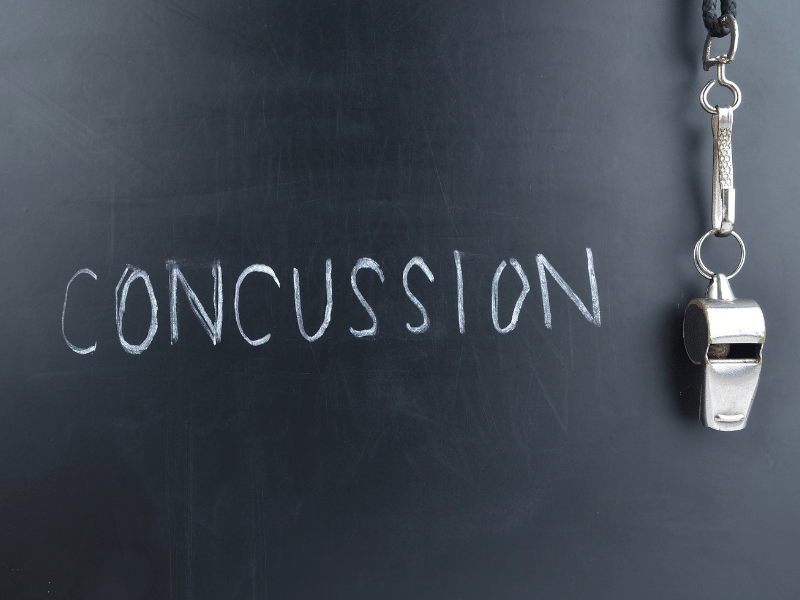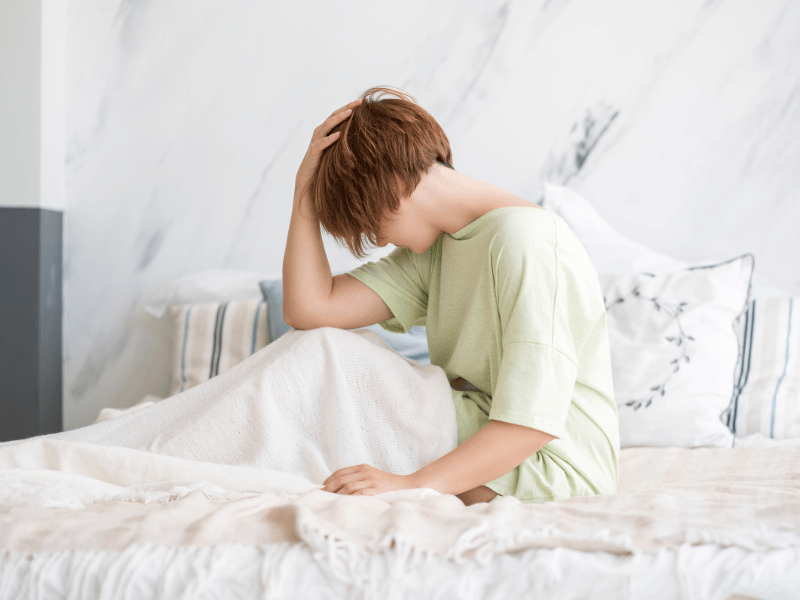


Can you sleep with a concussion? You may have heard conflicting advice in the past, but medical experts now assure you that it is safe to rest after a traumatic brain injury. In this article, we’ll guide you through the key information you need about concussion and sleep hygiene tips to help you sleep well even with it.

Concussion is a blow, bump or jolt to the head that results in a temporary loss of normal brain function. It is a form of mild traumatic brain injury that may last for less than a day or up to months [1].
People with concussion may experience symptoms such as dizziness, confusion, headache, nausea, loss of memory, or difficulty falling asleep [2].
Approximately 30% of concussion patients report insomnia symptoms and continued sleep disruptions after a concussion. 25% of patients also experience hypersomnia (excessive daytime sleepiness) within the first few days of injury [3]. It’s common to feel sleepy and take extra naps in the first week after a concussion, then have trouble sleeping in the following weeks. Poor sleep in children with concussions leads to more severe symptoms and longer recovery time.
The worry that someone with a concussion should stay awake stems from an old fear that it could lead to a coma or even death. In truth, sleep doesn’t cause such outcomes. Yet, there’s a catch: if someone is asleep, it’s impossible to spot symptoms of serious head injury.
So, while sleep itself isn’t harmful for someone with a concussion, it’s wise to seek medical advice before going to bed. Even if it’s a mild concussion, it should not be taken lightly as there’s a chance that it may cause permanent damage [2].

After someone suffers a head injury, it’s crucial to monitor them closely within the initial 24-hour period. Medical experts recommend that caregivers should gently awaken the person with the concussion every couple of hours.
During these wakeful moments, it’s helpful to ask them simple questions to check their awareness and watch for any odd behaviors. It’s also advisable to briefly shine a light into their eyes to see if the pupils are equal in size and react normally to the light.
This vigilance helps detect any slow bleeding that might occur due to the injury.
To improve your sleep during concussion recovery, try implementing these helpful tips.
For long-term sleep problems related to a concussion, sleep specialists can provide advanced testing and develop personalized treatment plans.
If you’re experiencing ongoing sleep issues after a concussion, it’s important to seek the expertise of a sleep specialist. These specialists have the knowledge and tools to assess your sleep quality and determine the underlying causes of your sleep disorder.
They can conduct advanced tests, such as polysomnography, to monitor your brain waves, heart rate, and breathing patterns during sleep.
Additionally, sleep specialists are familiar with post-concussion syndrome and the specific sleep disturbances that can occur as a result.
They can tailor treatment plans to address your individual needs, including cognitive-behavioral therapy for insomnia, medication management, or other interventions to improve your sleep and overall well-being.

If you frequently experience sleep issues after a concussion, you may want to consider seeking medical advice from your healthcare provider as soon as possible.
If you are also experiencing symptoms such as slurred speech, seizures, inability to wake up, worsened symptoms that persist after 10-14 days or find yourself frequently losing consciousness, it is a good indicator that you may need to seek immediate medical attention.
After a concussion, the brain needs rest to heal properly. It’s important to avoid activities that might delay recovery or worsen symptoms. Caregivers, especially parents of children who have had a concussion, should ensure these restrictions are followed:
It’s critical to adhere to these guidelines until a full recovery from concussion symptoms is achieved to ensure the safety and health of the individual.
Sleep is not only safe after a concussion but also essential for recovery. Proper sleep hygiene, a controlled sleep environment, and medical attention when necessary can support healing and prevent long-term sleep disturbances.
If you’re struggling with sleep after a concussion, the ShutEye® app can help you track your sleep patterns and improve your rest with personalized insights. Download ShutEye today and take control of your sleep health!
American Association of Neurological Surgeons (2024) Concussion [online]. Available at: https://www.aans.org/patients/conditions-treatments/concussion/
John Hopkins Medicine (2025) Concussion [online]. Available at: https://www.hopkinsmedicine.org/health/conditions-and-diseases/concussion
Mosti, C., Spiers, M. V., & Kloss, J. D. (2016). A practical guide to evaluating sleep disturbance in concussion patients. Neurology: Clinical Practice, 6(2), 129 [online]. Available at: https://doi.org/10.1212/CPJ.0000000000000225